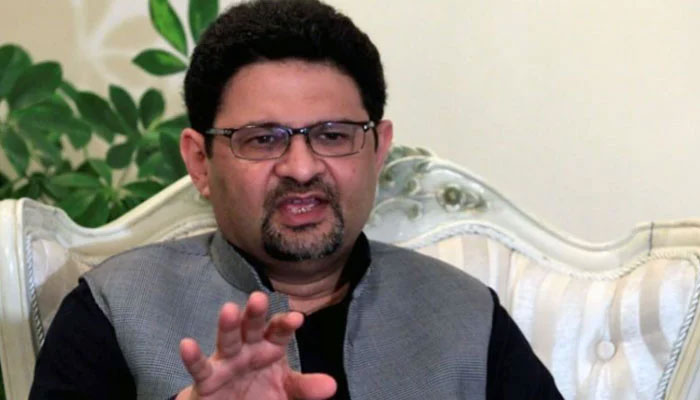Tough decisions caused political setbacks: Miftah
Miftah Ismail said the government would be able to manage external financing gap of $4 billion soon
ISLAMABAD: Federal Minister for Finance Miftah Ismail said Tuesday the government would be able to manage external financing gap of $4 billion soon.
“We will be able to fulfil the external financing gap of $4 billion soon. We will satisfy the IMF and there will be no problem to manage external gap”, Federal Minister for Finance said while talking to The News.
When asked about the rising pressures on exchange rate and persistent depreciation of rupee against the US dollar, the finance minister said the import compression was paving the way for getting the desired results as imports in first 18 days of July stood at $2.6 billion, and it was expected that the total import bill would not exceed beyond $5.5 billion for whole July 2022. The dollar was appreciating against all other currencies, he said and added the economy would be stabilised.
However, sources said the repayments obligation created increased the demand for dollar in interbank market, but the State Bank of Pakistan did not intervene in the market, so the rupee continued its nosedive against the dollar.
They said the share of Saudi Arabia in IMF’s quota on account of Special Drawing Rights (SDRs) might be transferred to Pakistan. This option is under consideration and Pakistani authorities confirmed that the IMF had contacted KSA for getting their permission to allow Islamabad to get benefits from KSA shares.
“The modalities are under consideration and decision to this effect may be finalised within the next couple of weeks,” said one top official.
The sources said it would be quite strange on the part of the IMF it was asking the recipient of loan country to manage external financing gap, as this condition as prior action should not be accepted by Pakistani authorities. Instead of meeting the whole external gap by the IMF, it has shifted the responsibility on Pakistani authorities to fill this gap of $4 billion and then the IMF’s Board would grant its assent for completion of 7th and 8th reviews and release of $1.17 billion for Pakistan’s struggling economy.
The finance minister said it was the coalition government’s “priority” to save Pakistan from defaulting after the rupee hit an all-time high against the dollar and the stocks took a battering during the day’s trade.
The Pakistani rupee hit a record low of 224 against the dollar in afternoon interbank trade before closing at 221.99 — the highest day-on-day depreciation after June 26, 2019 — while the benchmark KSE-100 index closed at 40,389.07 points — a 20-month high.
Analysts said political uncertainty arising after the Punjab by-polls, the International Monetary Fund’s (IMF) delay and the depleting Forex reserves have had adverse impacts on the market.
The finance minister, while speaking in the Geo News programme “Aaj Shahzeb Khanzada Kay Saath”, also voiced the same concerns, saying the rupee’s depreciation was not currently linked to supply and demand. He said the rupee was continuously falling due to political instability, gambling and speculations. But at the same time, he said the danger of default was not looming over Pakistan.
The finance minister credited the coalition government’s tough decisions for avoiding default. Raising petroleum products’ prices and power and gas tariffs, among other fiscal measures also paved the way for the crucial staff-level agreement with the IMF.
In a bid to secure the IMF loan, Prime Minister Shehbaz Shehbaz imposed three fuel price hikes — cumulatively totalling 50% — and raised the cost of electricity to effectively end the subsidies introduced by Imran Khan government. But after the IMF deal was secured, the government decreased the price of petrol by Rs18.50 per litre and that of diesel by Rs40.50 per litre.
Miftah said if the government gets fiscal space, it will reduce the price of petrol further. He assured the government was trying to overcome a major hurdle of the current account deficit and reduce it, while at the same time increasing exports so that the pressure on the economy subsidies.
He said if the government continues, it would be a good sign for Pakistan as it will bring stability. Miftah said despite instability, the economy’s roots had “strengthened” over the last four months. He noted it was crucial for the government to take unpopular measures. But he said it also resulted in political setbacks — the PMLN has been defeated by PTI in Punjab by-elections. “If need be, we will take more tough decisions,” he said. Miftah said the loan from IMF would soon be received and after that friendly countries would lend a hand to Pakistan.
-
 Pedro Pascal Pays Emotional Tribute To Catherine O'Hara After Her Death
Pedro Pascal Pays Emotional Tribute To Catherine O'Hara After Her Death -
 ‘Vulnerable’ Prince Harry Stands To Go Backwards In Time And Become The Spare Again: Here’s Why
‘Vulnerable’ Prince Harry Stands To Go Backwards In Time And Become The Spare Again: Here’s Why -
 Charli Xcx Says Sorry To Mary J. Blige After 11 Years Of Pink Fluff Mishap
Charli Xcx Says Sorry To Mary J. Blige After 11 Years Of Pink Fluff Mishap -
 Yerin Ha On Carving Her Own Path As 'Bridgerton' Season 4's Lead
Yerin Ha On Carving Her Own Path As 'Bridgerton' Season 4's Lead -
 Michael J. Fox Receives Praise From 'Shrinking' Season 3 Co Stars
Michael J. Fox Receives Praise From 'Shrinking' Season 3 Co Stars -
 Jacob Elordi Reveals Getting Burned During 'Wuthering Heights' Filming
Jacob Elordi Reveals Getting Burned During 'Wuthering Heights' Filming -
 Macaulay Culkin Pens Emotional Tribute To 'Home Alone' Mum Catherine O'Hara
Macaulay Culkin Pens Emotional Tribute To 'Home Alone' Mum Catherine O'Hara -
 Prince Harry Loses The Last Of Prince William’s Sympathy? ‘He Left London Entirely’
Prince Harry Loses The Last Of Prince William’s Sympathy? ‘He Left London Entirely’ -
 Rob Cesternino Shares Learning Essential Skills During Time On 'The Traitors'
Rob Cesternino Shares Learning Essential Skills During Time On 'The Traitors' -
 South Carolina Teen Arrested After Altercation With Mother Outside High School
South Carolina Teen Arrested After Altercation With Mother Outside High School -
 Estranged Husband Kills Wife In Florida Murder-suicide Hours After Leaving Jail
Estranged Husband Kills Wife In Florida Murder-suicide Hours After Leaving Jail -
 Kylie Kelce Plays Coy Over Travis, Taylor Swift Wedding Plans: 'Not Gonna Lie'
Kylie Kelce Plays Coy Over Travis, Taylor Swift Wedding Plans: 'Not Gonna Lie' -
 US Opens Civil Rights Probe Into Alex Pretti Shooting: Report
US Opens Civil Rights Probe Into Alex Pretti Shooting: Report -
 Prince William, Kate Middleton Decide Next Step For Prince George
Prince William, Kate Middleton Decide Next Step For Prince George -
 Catherine O’Hara: Home Alone Actress Dies After 'brief Illness'
Catherine O’Hara: Home Alone Actress Dies After 'brief Illness' -
 Princess Anne Refuses An Offer Made At Palace
Princess Anne Refuses An Offer Made At Palace




